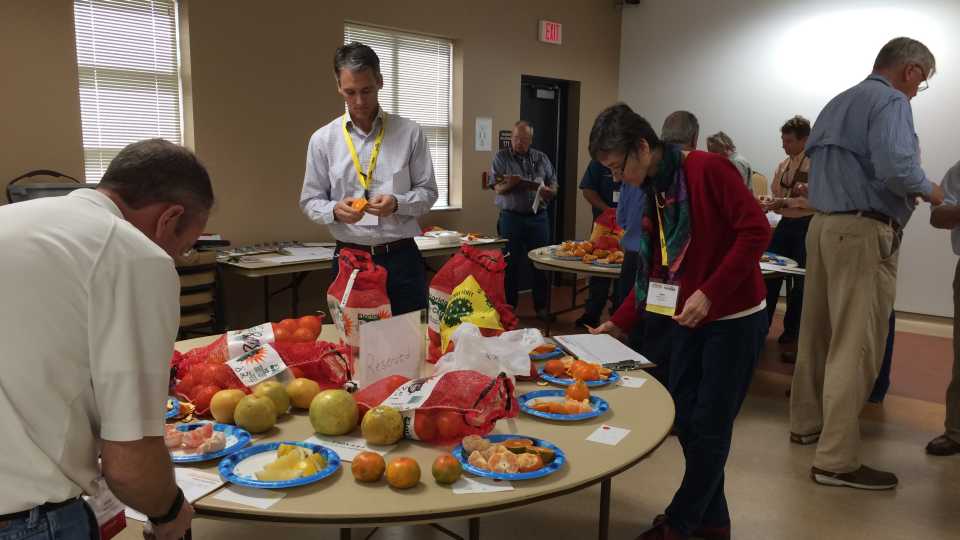
Throwback photo from when citrus variety displays were held in person. The pandemic has put a big squeeze on this type of key evaluation.
Photo by Paul Rusnak
Virtual communications platforms, though tiresome, have certainly enabled business communications to continue and, in some cases, foster more effective and inclusive dialogue than the “old-fashioned” face-to-face meetings. However, the virtual meetings that will forever be associated with 2020 have their limitations. Case in point, citrus variety displays.
The extensive public and private field trials evaluating production methods, grove architecture, rootstock-scion combinations, and other novel treatments to manage or minimize the effects of HLB will continue in earnest. This work includes numerous orange and grapefruit varieties on a myriad of root systems. Many of the trees in these funded experiments are in the ground and more are in the nurseries. The orange-like hybrids that may someday prove useful in the juice stream will require extensive field, laboratory, and consumer testing before processors can help inform growers on investment decisions.
However, there remains great value in gathering a diverse audience of growers, nurseries, processors, packers, production managers, and produce marketers en masse to experience and evaluate new citrus material emerging from the plant improvement programs. Though this may be more impactful for fresh selections, the processed sector has enjoyed and benefited from the UF/IFAS Citrus Research and Education Center (CREC) team offering selections intended primarily for processing in whole fruit, juice, and juice blend forms. Such displays, and the conversations that ensue, have generated interest in several cultivars and accelerated product development efforts and experimentation.
Fresh selections are even more reliant on the variety display experience. Because consumers will purchase and enjoy fresh selections as whole fruit, it is even more important to have a hands-on experience. Display attendees evaluate the fruit in the display in such detail, many feel that we have become more critical and discriminating than the average grocery store consumer. Selections are examined for peel color, peel texture, peelability, uniformity, and acceptability of size, aroma, flesh color, texture and flavor, juice content, segment structure, and the overall consumption experience. In a sense, it is surprising that anything gets approved for release.
Surveys: The Link Between Industry and the Marketplace
Dr. Yu Wang, Professor of Micro-biology and Cell Science, and her staff compile and convert the data collected at the UF/IFAS CREC Variety Displays into a report. Though this is neither a large sample size nor a robust data package, the information from these displays helps advise release decisions, and the Plant Improvement Team places value on the direct connection between industry and the marketplace. It has been harder to entice attendees to take the time to complete the surveys, but extensive work was done last spring to revise and simplify the data collection method. New Varieties Development and Management Corporation (NVDMC), the CREC Plant Improvement Team, and Wang are confident that a reduced number of fruit selections, fewer questions, revised clear language, user-friendly computerized data entry, and automated report generation would improve the process and speed the results to the end-users.
COVID-19 has made it necessary to pause all UF/IFAS Variety Displays until further notice. Displays often attract 75 or more people, and appropriate social distancing would be difficult. Face masks are required on campuses but would be impractical when sampling fruit. Since industry cannot afford to lose an entire year of evaluation, NVDMC will work closely with the UF/IFAS Plant Improvement Team to develop an alternate means of collecting information and engaging industry. USDA-ARS has had strict policies at the U.S. Horticultural Research Laboratory as a means of reducing the spread of COVID-19 and protecting staff and visitors.
A USDA citrus variety display is scheduled for Ft. Pierce on Nov. 20, 2020 and a field day at the Whitmore Foundation Farm near Leesburg on Dec. 1, 2020. However, unless there are significant changes to the COVID-19 situation, both of these USDA events are cancelled until there is greater assurance that the functions can be held safely and in adherence with USDA policy. As with UF/IFAS, NVDMC will make every effort to develop an alternate means of collecting information on selections ready for evaluation. Please stay tuned for more information.









